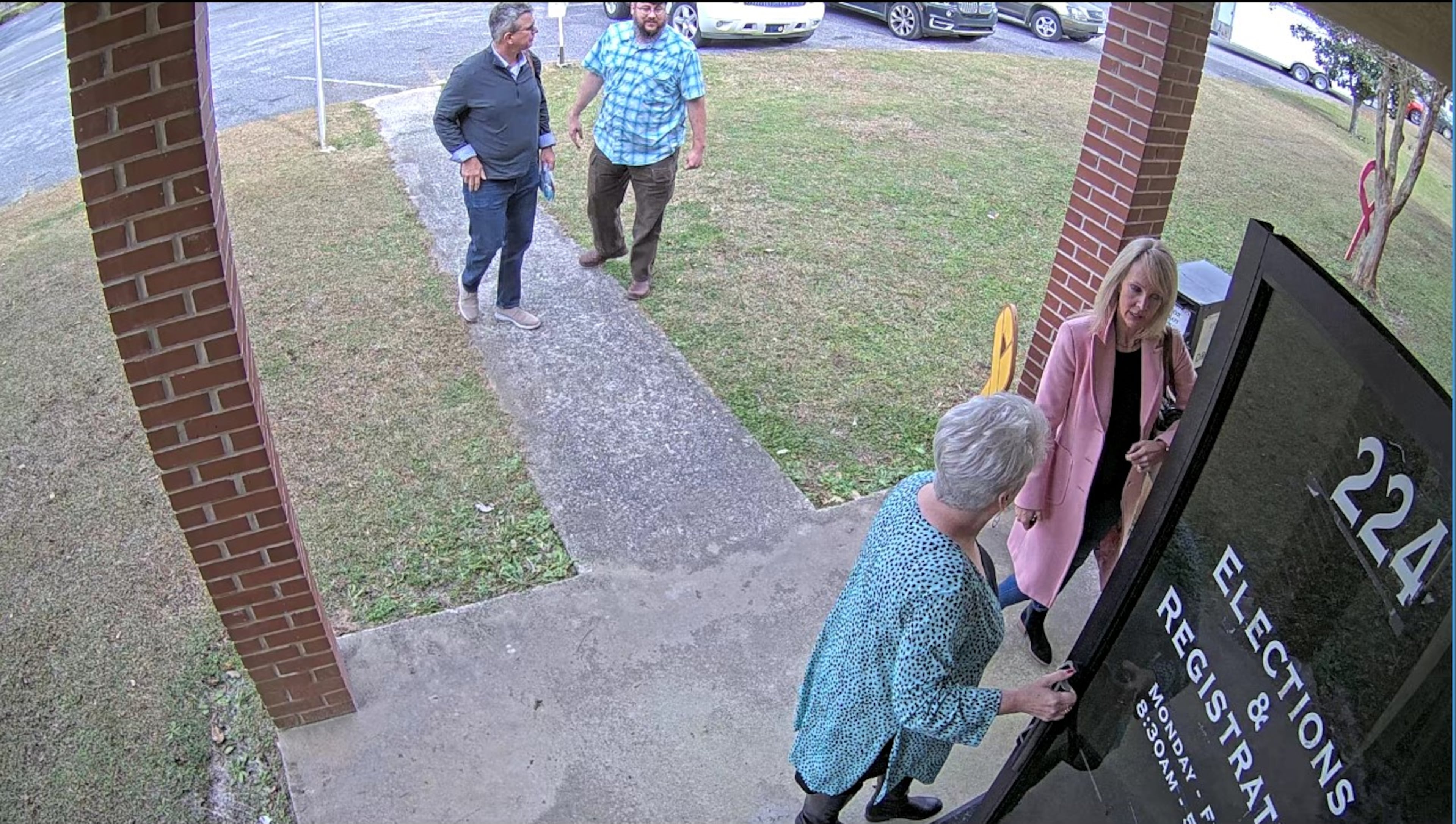No consequences so far after Trump supporters copied Georgia election data

Caught by surveillance video, text messages and emails, overwhelming evidence shows that supporters of then-President Donald Trump copied Georgia’s statewide voting software from an election office in rural Coffee County in early 2021.
Yet no one has been charged, the FBI doesn’t appear to be investigating the case, and the GBI investigation has been pending for eight months.
So far, everyone involved in the scheme has escaped accountability, including former Trump attorney Sidney Powell, a phony Republican elector who tried to award Georgia’s votes to Trump, and county election officials who helped them take vast amounts of election data.
They copied the files on Jan. 7, 2021 — the day after a mob attacked the U.S. Capitol and two days after runoffs in Georgia flipped control of the U.S. Senate.
Georgia law enforcement and election officials say they’re taking the case seriously, but little information has been made public while the investigation remains open.
Election security experts have warned that the disclosure of the inner workings of Georgia election computers increases the risk of hacks in future elections, and it could be used to fabricate evidence or spread misinformation.
“The message the GBI is telling people is that it’s OK to go into Georgia and take our software and nothing is going to happen to you. The same message is coming from the FBI, too,” said Susan Greenhalgh, senior adviser for the advocacy group Free Speech for People. “There’s no publicly available information that would indicate this investigation is being executed with great rigor.”

Although a group of election security advocates asked for a federal inquiry into the multistate “plot” to copy election data in several states including Georgia, the FBI told Greenhalgh in a letter in January that it wouldn’t assist without a formal request from a state investigating agency. The FBI didn’t respond to an email from The Atlanta Journal-Constitution seeking comment.
The FBI isn’t assisting Georgia’s investigation, GBI spokeswoman Nelly Miles said.
“The computer trespass investigation in Coffee County involving election equipment is active and ongoing,” Miles said. “The GBI is partnering with the Georgia attorney general’s office on this investigation.”
State Election Board Chairman Bill Duffey said during a public board meeting in September that he had asked the FBI to participate in the investigation, but there’s no indication it complied with his request. The State Election Board the authority to levy fines for violations of state election laws.
“We are resolved to holding fully accountable those who engage in conduct that damages the integrity of our election process,” Duffey, a retired federal judge, said Friday. “We will not allow people to undermine public confidence in elections in our state.”
The State Election Board has shared information with the GBI as it became known, including some that was discovered recently, he said.
Once the state investigation is completed, Georgia Attorney General Chris Carr’s Prosecution Division will consider its next steps, spokeswoman Kara Richardson said.
“The GBI’s investigation is active and ongoing (so it is very much progressing),” Richardson wrote in an emailed response to the AJC.
Investigations of unauthorized access to election equipment are also underway in other states. For example, Michigan’s attorney general appointed a special prosecutor in the fall to consider bringing charges, and former Colorado clerk Tina Peters faces felony charges involving allegations she allowed a copy of a hard drive to be made in search of proof of conspiracy theories promoted by Trump.
Revelations that sensitive election data had been copied in Georgia only became public last summer as a result of a long-running election security lawsuit.

Through the case, plaintiffs in the lawsuit found security video showing Cathy Latham, one of 16 Republicans who attempted to cast Georgia’s electoral votes for Trump, as she escorted computer experts into the Coffee County elections office. They were also accompanied by former Coffee Elections Director Misty Hampton and former county election board members Eric Chaney and Ed Voyles.
The case also uncovered documents showing that Powell was billed over $26,000 by the tech experts from an Atlanta-based firm, SullivanStrickler, for the data copying, along with text messages between those involved.
“Sidney, everything went smoothly yesterday with the Coffee County collection. Everyone involved was extremely helpful,” SullivanStrickler Chief Operating Officer Paul Maggio wrote in an email to Powell on Jan. 8, 2021.
After copying the data, it was distributed through a file-sharing website to conspiracy theorists who denied the results of the presidential election, which Trump lost in Georgia by about 12,000 votes.
Later that month, surveillance video showed two other people also visited the Coffee County elections office: Cyber Ninjas CEO Doug Logan, who led a controversial Republican ballot review in Arizona after the 2020 presidential election, and Jeff Lenberg, a computer security consultant who analyzed voting equipment in Michigan and New Mexico.
There’s no evidence that hacks or malware have ever manipulated election results in any Georgia election. But election integrity advocates say they remain concerned that the information copied from Coffee County could be used to attempt to undermine or tamper with future elections.



